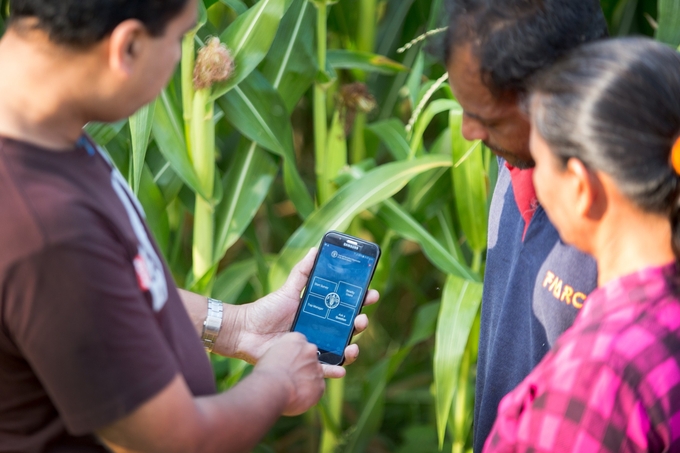May 21, 2025 | 06:40 GMT +7
May 21, 2025 | 06:40 GMT +7
Hotline: 0913.378.918
May 21, 2025 | 06:40 GMT +7
Hotline: 0913.378.918

FAO's work involves scientific approaches, innovation, and the latest technologies.
The Food and Agriculture Organization of the United Nations (FAO) is marking this year’s International Day of Plant Health by shining a light on the importance of leveraging innovation to protect plants, which are indispensable for sustaining life on earth.
This year’s observance on May 12 focuses on the many innovations that cut across areas where plant health is crucial – such as plant pest monitoring to protect agricultural production – and digital systems to ensure the safe international trade in plants.
“We have no option but to leverage innovation, technological advancements and tools to protect plants,” says FAO Deputy Director-General Beth Bechdol. “The unprecedented global challenges we face, such as the unrelenting climate crisis, demand innovative approaches and digital technologies to support countries with stronger pest surveillance and early warning systems,” she added.
The UN-designated International Day of Plant Health (IDPH) is a key legacy of the International Year of Plant Health 2020. Ever since then it has been raising global awareness on how protecting plant health can help end hunger, reduce poverty, protect biodiversity and the environment, and boost economic development. This year’s celebrations at FAO includes a high-level event on 13 May.
Plant health should be prioritized given up to 40 percent of food crops are lost due to plant pests and diseases every year. This affects global food security and agriculture, the main source of income for many vulnerable rural communities. Climate change and weather extremes are also impacting plant health and altering ecosystems, while creating new niches for pests to thrive.
International travel and trade, which has tripled in volume in the last decade, has led to increased interconnectedness among countries and regions. This underlines the importance of ensuring that people, goods and commodities crossing borders do not carry pests and diseases affecting plants, animals and humans.
Technologies to safeguard plants
FAO’s work on plant production and protection involves scientific approaches, innovation, and the latest technologies.
It includes supporting governments to conserve plant genetic resources and develop viable seeds and stress-resistant crop varieties to increase crop productivity. It also involves working towards sustainable pest and disease management, by closely collaborating with individual countries and communities such as the International Plant Protection Convention (IPPC).
Through the IPPC, FAO is implementing the Africa Phytosanitary Programme to build capacities and supporting countries in using the latest scientific evidence and digital technology in detecting plant pests.
Key to detecting plant pests, such as Desert Locust, is the ability to transmit real-time data to national locust centers by using Geographic Information Systems to collect and manage data on pests, as well as a suite of smartphone apps. Early detection of these pests enables FAO to provide timely support for farmers, resulting in reduced losses to crops.
In Ecuador, FAO has also been promoting the use of biotechnology in crop production and protection, through the successful implementation of a fruit fly pest control system that uses the sterile insect technique. This involves rearing and sterilization of large numbers of male insects to mate with wild females, producing no offspring and thus reducing the insect population.
Meanwhile the adoption of the IPPC ePhyto Solution, providing for electronic plant health certificates, is making international trade in agricultural products faster, safer and more efficient. More than 120 countries have adopted the Solution and more than three million ePhyto certificates have been exchanged.
(FAO)

(VAN) Attempts to bring down the price of the Japanese staple have had little effect amid a cost-of-living crisis.

(VAN) Fourth most important food crop in peril as Latin America and Caribbean suffer from slow-onset climate disaster.

(VAN) Shifting market dynamics and the noise around new legislation has propelled Trouw Nutrition’s research around early life nutrition in poultry. Today, it continues to be a key area of research.

(VAN) India is concerned about its food security and the livelihoods of its farmers if more US food imports are allowed.

(VAN) FAO's Director-General emphasises the need to work together to transform agrifood systems.

(VAN) Europe is facing its worst outbreak of foot-and-mouth since the start of the century.

(VAN) The central authorities, in early April, released a 10-year plan for rural vitalization.